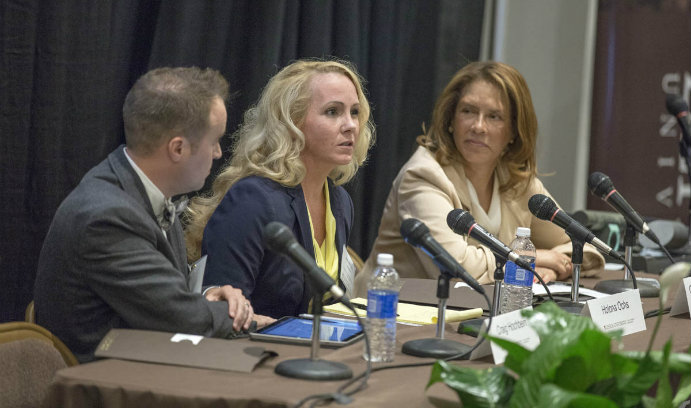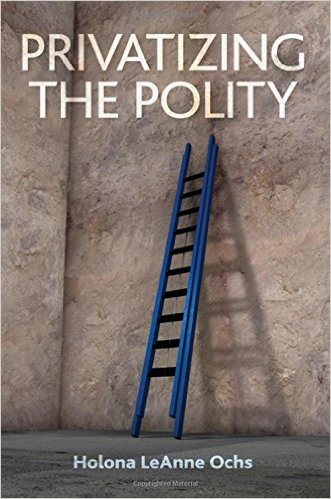Changing the welfare conversation

Holona Ochs, center, an associate professor of political science, has authored a new book, Privatizing the Polity.
Holona Ochs came to public policy work from a career as a marriage and family therapist, where she witnessed first-hand the effects of policies on people. As a result, much of her research has explored the consequences of policies—both social and governmental—on the individuals and groups they are explicitly designed to assist.
She has delved into the role of citizen review of the use of lethal force by police in the United States and explored how tipping shapes workers’ experiences. Now Ochs, associate professor in Lehigh’s Political Science Department, has turned her attention to welfare reform and its impact on people living in poverty.
Not solely interested in identifying the problems, Ochs latest book, Privatizing the Polity, lays the groundwork for discovering the solutions.
“I wanted to gather the data to show what is working, so we can do more of that,” said Ochs. “I also wanted identify what is not working, so we can change it.”
In Privatizing the Polity, Ochs analyzes 18 years of data from 1990 to 2008 and tracks the changes enacted by welfare reform, the 1996 deal struck between Congressional Republicans and then-President Bill Clinton. Welfare reform policies have increasingly led to private sector management of its implementation, resulting in wide variations in the program’s structure from state to state.
The main finding: Poverty is more entrenched than ever. People living in poverty are working more for less money. In addition, more people are becoming impoverished as the privatizing of welfare has resulted in the transfer of money from low-income populations to the wealthy. In other words, with the private sector profiting financially from some aspects of welfare—such as through the collection of interest and fees on child support payments—less money is staying in the hands of welfare recipients as it moves into the coffers of business owners.
According to Ochs, the net effects of welfare reforms have not produced broad-based opportunities to move out of poverty. In fact, the more people living in poverty work, the more intense poverty is in the aggregate over time. But the framework for understanding poverty governance as a system presented in Privatizing the Polity outlines the myriad opportunities for learning more about what works in different contexts so that these aggregate trends may be reversed.
"My primary purpose in researching and writing the book was to examine the impact that welfare reform has had on lifting people out of poverty," said Ochs. "The data makes clear that the privatization of welfare implementation has made it harder than ever for people to lift themselves out of poverty. People are working more and their money isn’t going very far."
One example: In South Carolina, where child support collection for Medicaid recipients is privatized, there is no limit to the amount of interest that private collections agencies can apply to late child support payments. At least one in eight incarcerated South Carolinians were jailed over the last decade due to a failure to pay child support. Across the United States, as many as 50,000 parents may end up behind bars for the same reason.
Only 13 states place legal limitations on the interest and fees private agencies can apply to child support collection. Most states have aggressively pursued criminal charges against those with child support arrears. Consequently, the primary reason for child support debts are the interest and charges imposed.
Ochs’ book also explores some of the fundamental challenges of Individual Development Accounts, also known as IDAs which are designed to “bring the poor into the economic mainstream.” The program essentially offers people living in poverty incentives to open bank accounts.
Says Ochs: “While there are positive aspects to IDAs, the program is based on two flawed premises: one, that ‘the poor don’t know how to save’ and, two, that the government—along with profit-driven banks—should be the ones to teach them.”
Among the most significant factors affecting the most marginalized individuals is a lack of control over their own accounts. In some cases, individuals are in the de-humanizing position of having to ask case managers if they can access their own money to address medical needs, transportation, and emergencies.
In addition, participating banks reap financial gain through interest rates and fees charged, raising the question: Who benefits most from the program, people living in poverty or banks?
Privatizing the Polity proposes numerous areas ripe for further exploration, including the potential for social entrepreneurship to generate opportunities, proactive strategies for addressing biases that perpetuate disparities in access to opportunities and interventions that reduce the risk of domestic violence, which plays a key role in the feminization of poverty.
Investments in microenterprise and social entrepreneurship that follow the tradition of “do for self” are among the examples of proactive strategies for improving the conditions of impoverishment while simultaneously addressing biases that hinder development in low-income communities. Efforts to utilize the various sources of funding for welfare efforts (e.g.; Temporary Assistance for Needy Families, Community Development Block Grants, and Workforce Investment Act funds) to foster small business development in impoverished communities by the people living in those communities have tremendous promise as antipoverty measures, particularly where women and minority-owned business are supported.
Finally, Ochs’ book outlines a research agenda aimed at promoting a greater understanding about how to foster empathy and innovation in the public interest.
Photo by Christa Neu
Posted on:


